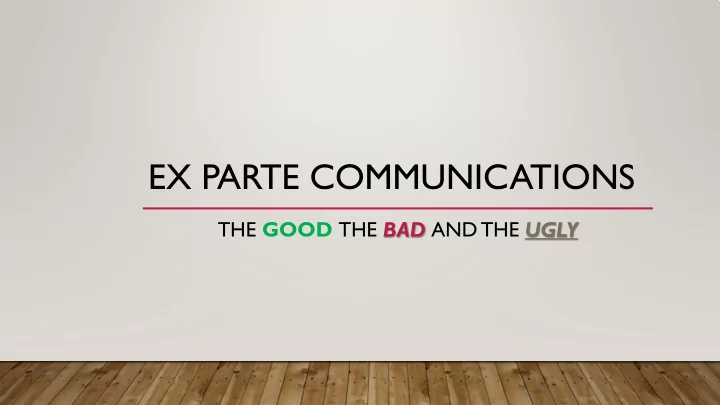

EX PARTE COMMUNICATIONS THE GOOD THE BAD AND THE UGLY
EX PARTE – LEGAL DEFINITION • "Ex parte communication" is a direct or indirect communication on the substance of a pending case without the knowledge, presence, or consent of all parties involved in the matter. Generally, ex parte communication is prohibited in legal proceedings.
EX-PARTY COMMUNICATION
DUE PROCESS • Due Process Clause • The Fifth and Fourteenth Amendments to the United States Constitution each contain a due process clause. Due process deals with the administration of justice and thus the due process clause acts as a safeguard from arbitrary denial of life, liberty, or property by the government outside the sanction of law. The Supreme Court of the United States interprets the clauses broadly, concluding that these clauses provide four protections: procedural due process, substantive due process, a prohibition against vague laws, and as the vehicle for the incorporation of the Bill of Rights.
DUE PROCESS • The Fifth Amendment • No person shall be deprived of life, liberty, or property, without due process of law. • This part of the Fifth Amendment originally applied to only Federal courts.
DUE PROCESS • Fourteenth Amendment • No state shall deprive any person of life, liberty, or property, without due process of law; nor deny to any person within its jurisdiction the equal protection of the laws. • This brought these protections directly to state courts, including yours.
CAN EX PARTE BE A GOOD THING? • Ex parte refers to a motion or petition by or for one party. An ex parte judicial proceeding is one where the opposing party has not received notice nor is present. • Improper ex parte communication can deprive due process and rob a person of their right to justice. • Are there any examples of times where ex parte discussion is actually a good thing?
EXAMPLES OF EX PARTE BEING A BAD THING • If an ex parte communication is discovered during trial, there will likely be a hearing to determine what was said and to whom. If the communication involves jurors, the jury could be told to disregard the communication, or the juror who received or made the communication could be dismissed. If the communication involves the judge, the judge could disclose the communication and agree to disregard it. In very serious situations, the judge could agree to recuse him or herself from the trial or there could be a mistrial. • There are times that the ex parte communication does not come to light until after the conviction. Criminal verdicts may be overturned if the appellate court finds that the ex parte communication influenced the verdict and violated the defendant’s due process rights.
HOW IT CAN GET UGLY • Texas Commission on Judicial Conduct • Texas Canons of Judicial Conduct • Canon 3B(8) • A judge shall accord to every person who has a legal interest in a proceeding, or that person's lawyer, the right to be heard according to law. A judge shall not initiate, permit, or consider ex parte communications or other communications made to the judge outside the presence of the parties between the judge and a party, an attorney, a guardian or attorney ad litem, an alternative dispute resolution neutral, or any other court appointee concerning the merits of a pending or impending judicial proceeding
FOR MY FRIENDS Hon. Tramer J. Woytek Lavaca County Judge judgetw@co.lavaca.tx.us 361-798-2301 Cell#361-772-6266
Recommend
More recommend